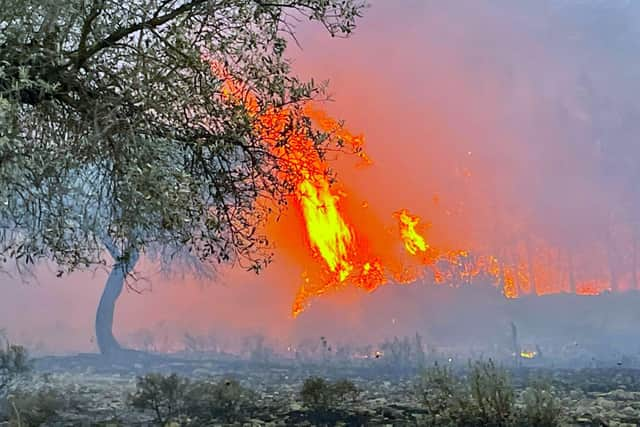My experience in Rhodes shows we’ll all be forced to pick a side regarding foreign holidays - Jayne Dowle
At the airport on Tuesday, people who had to run from their hotels in swimwear and flip flops, who had been picked up on trucks by locals, leaving all their belongings behind, sleeping in schools and shelters, spoke calmly in the departure lounge about what they had been through.
On the plane back, I sat next to a nine-year-old boy who, along with his two younger brothers and parents, was evacuated by truck from near Lindos.
Advertisement
Hide AdAdvertisement
Hide AdHis father showed me phone footage of burnt-out sunbeds, hillsides covered in grey ash like battlefields. Another passenger said he’d seen grown men punching children to get onto escape boats.


What started as a relaxing mother-and-daughter trip turned into a holiday I will never forget, leaving memories of a beautiful place, yes, but also some deep thinking about where to travel, how to travel and when to travel in future.
Last Saturday, my 17-year-old daughter, Lizzie, and I spent the day on the beach, oblivious of the blazes ravaging the south of the island, but by 8pm, we were on high alert in case we had to flee our hotel in Faliraki.
This area of Rhodes, on the east coast between Rhodes Town in the north and Lindos in the south, has not been directly affected by the devastating wildfires which saw thousands of tourists and local people running for their lives.
Advertisement
Hide AdAdvertisement
Hide AdYet for the second half of our holiday, Lizzie and I could not escape an unsettling feeling of anxiety, trepidation and guilt.
Stopping at a café-bar for a cold drink on the way back from the beach – temperatures were in the high 30s, early 40s, one afternoon was too hot to even walk down the street – we thought nothing of the power cut that meant we had to pay in cash. Power cuts in high summer are often a minor inconvenience, in the UK too, as recent extreme weather proves.
However, in the next couple of hours we found ourselves stocking up on water, withdrawing enough cash to last us our three remaining days, packing our bags in readiness to run, frantically charging phones when the power was on, and making an escape plan from our third-floor hotel room.
At first, Lizzie thought I was being over-cautious. That was until we nipped out to pick up some street food around 8.30pm and the whole of central Faliraki suddenly plunged into darkness again. Her face fell. She knew then the emergency was real.
Advertisement
Hide AdAdvertisement
Hide AdFor the rest of our stay, we didn’t move far from the hotel, just in case. On Monday, in the middle of another power cut (we popped out to buy a few souvenirs), we received an emergency alert on our phones telling us that the fires were moving 10km closer, with villages north of the original blazes under evacuation orders.
Yet here’s the thing. Whilst Lizzie and I immediately sat down on a doorstep and Googled ‘distance from Masari and Malonas to Faliraki’, many tourists carried on around us eating their lunch, sipping their drinks and appearing unconcerned. We were shocked, frankly.
Or were they being rational? Only 10 per cent of the island of Rhodes is thought to be affected by wildfires, with just 42 hotels closed, it’s reported. We never even smelled smoke in Faliraki.
Who was right, and who was wrong? I know this is yet another polarising question for our times, but I sense that in the coming months and years, we’ll all be forced to pick a side on foreign holidays.
Advertisement
Hide AdAdvertisement
Hide AdIs it sensible to avoid areas of the world experiencing unprecedented high temperatures which can if not directly cause – several people have been arrested for arson on Rhodes – but exacerbate natural disasters such as wildfires?
Or is such a cautious approach actually falling victim to panic, leading to devastation of a different kind, wrecking local economies reliant on tourism?
I asked a shopkeeper in Faliraki, who enquired if Lizzie and I were ‘from the fire’ and tried to give us clothes from her rails, what she thought. With tears in her eyes, she said Rhodes residents were embarrassed and angry that Greek authorities had let the wildfires rage without stopping them earlier. And advised us if/when we come back, to pick September as it’s the most temperate month.
This kind, considerate woman lives there. Her business and family are there. We, however, have a choice. And it is one that is going to become far more difficult to make.
